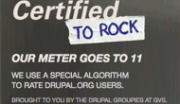GVS is now part of Acquia. 
Drupalcamp Atlanta and best practices for event websites in Drupal
Drupalcamp Atlanta recently launched their new site for the 2010 Camp. I reviewed some of their features and found it to be a solid site. As the GVS team increases our focus on selling events with Drupal, I wanted to hear more about the backend of the site. So, I got in touch with Brent Ratliff who was the lead developer on the site, to find out how the site was built.
Adding Signups and Payment to an Event Site: UC Signup
In 2009, the site was a standard build relying mostly on Views and content types. For 2010 they needed all of the features from the previous year but also needed to charge an entry fee for the event, for individual sponsorships, as well as the ability to submit and vote on sessions. The Atlanta Drupal Users Group decided to base their 2010 site on the acclaimed 2009 Drupalcamp LA site that was released as a zip file. The LA code, updated with new module releases, handled the voting, some nice Views, helpful theme functions, context, and some of the "attendee logic," but not the e-commerce portion. Brent was familiar with using the UC Node Checkout module for building an event site, but ultimately decided to go with the Ubercart Signup integration module along with Rules and custom hooks to handle workflow. UC_Signup allows them to collect profile information from users during checkout and helps keep track of attendees using the Signup module. They also grant roles to users based on which products they have purchased.
Panels vs. Context? Both
On the topic of Panels vs. Context, Brent said he follows the practice of using both modules. Context is responsible for block placement on the site and changing the active menu item on some pages of the site to give a more consistent feeling as you navigate around. Panels is responsible for the main "content" area in a few parts of the site, allowing the site to pull in Views and other content into complex landing pages without having to write much code. Arguments can also easily be passed from the Panel directly to the Views and the Panels can be exported along with features for version control while remaining theme independent. Panels also allow Skinr styles to be applied to content via the UI and for content editors to easily add or remove relevant components as the camp timeline changes, such as removing session voting and adding a session videos after the camp. One example of this is the sponsors page built with four Views embedded into a Panel.
Call to Action on Views for Usability
They are using some PHP in the Views headers and block bodies to present appropriate call-to-action blocks to site visitors. For example, on the sessions view, anonymous users see a suggestion to register for the camp. If you are logged in and registered you'll see a request to "submit a session". The same is true for the voting widgets and any other privileged callouts that require the "attendee" role, triggered by a successful Ubercart checkout. In the LA camp site, as it was a free event, any registered user had these abilities.
Performance and troubles with Pressflow
The Drupalcamp Atlanta site is using Pressflow and Varnish to maintain a fast response time for their visitors. In fact, Brent is giving a presentation on Using Pressflow and Mercury to achieve a super fast site. However, Pressflow caused some problems with the Ubercart shopping cart block so Brent had to use some custom code and the Ajax cart module to let anonymous users see the cart contents.
Schedule of Events: Always a challenge
One area where they want to do more is the Schedule. Currently it's just a Google Spreadsheet embedded into the page, but ideally it could be built based on Views. As part of GVS work on the COD - the Conference Organizing Distrubution distribution, we will be releasing a Views+CCK based schedule builder in the next few weeks.
Conference Organizing Distribution vs. Build your own
When I asked Brent about why they didn't use COD he said it was simply a lack of knowledge of COD's availability. He said they based some of the site on the features from Drupalcamp Colorado and just didn't know that they had been packaged up into the COD_Support features.
For the future, though, he said he would definitely base his work on the COD and COD_Support packages since they are a modular, features-based system that make it easy to pick and choose the parts you need and then contribute back enhancements, while maintaining the ability to modify workflow through customization. Brent also feels it's much better using a distribution where you start off with a fresh installation and turning on compartmentalized features as you need them rather than using a database export which may have cruft in it.
A few weeks after our conversation, Brent got back in touch with me to say:
We're running into groups who want one account to set up
multiple attendees. Live and learn. Take it as validation to the COD
approach and uc_signup.
That was a feature that GVS built into UC Signup from the beginning and which was used on the Drupalcamp Colorado site by several large companies, one of which purchased tickets for their 30 attendees all at once. Brent disabled the feature at the cart level to make their site simpler.
Sharing Events Best Practices
It's great to hear about best practices in building event management sites and to share those ideas with other camp builders.
- Last weekend I participated in a call with the fun folks from LA Drupal which is now available: LA Drupal Podcast 8: Rocking Drupal where we discussed the future of camps vs. summits vs. cons and the idea of a distribution like COD.
- This coming Wednesday, September 8th, GVS will be hosting a Free COD support hour in IRC (#drupal-cod) and Skype. This is just the first of what will hopefully be many events where Drupal site builders can get together to share tips and tricks and get support.
- Login to post comments
GVS projects
GVS is now part of Acquia.
Contact Acquia if you are interested in a Drupal Support or help with any products GVS offered such as the Conference Organizing Distribution (COD).



